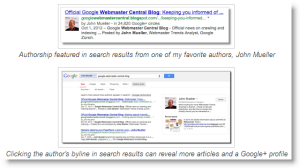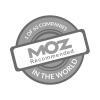 It’s been a long time since we’ve had any real information updates on Google Authorship and how it should be used from the horse’s mouth (that’s Google with the saddle on over there, by the way). That changed today with the posting of “rel=author Frequently Asked (Advanced) Questions” on the official Google Webmaster Central blog.
It’s been a long time since we’ve had any real information updates on Google Authorship and how it should be used from the horse’s mouth (that’s Google with the saddle on over there, by the way). That changed today with the posting of “rel=author Frequently Asked (Advanced) Questions” on the official Google Webmaster Central blog.
Developer Programs Tech Lead Maile Ohye answered seven questions. Most of them covered ground that any of us who have followed Authorship closely already knew, but several either provided new information, confirmed things we’ve speculated about, or provided new insights. In this post I’ll cover just those issues in terms of my take-aways from them and additional commentary. Read the whole article linked above for the rest.
1. Linking to Non-Content Pages Can Affect Your Authorship
To me, this is the most important part of the entire FAQ. This has been a topic of debate for some time, and now we have Google’s official word on it.
What’s the debate been about? As it has become more and more recognized that Authorship photos in search results can increase click through rate, there has been a rush in some segments to attach Authorship to everything and anything on their sites, including home pages, about pages, and product pages.
But here’s what the new FAQ says about that:
Authorship annotation is useful to searchers because it signals that a page conveys a real person’s perspective or analysis on a topic. Since property listings and product pages are less perspective/analysis oriented, we discourage using authorship in these cases. However, an article about products that provides helpful commentary, such as, “Camera X vs. Camera Y: Faceoff in the Arizona Desert” could have authorship.
Here’s an example of a jewelry store linking Authorship to its home page (example courtesy of Mike Blumenthal:

Clicking on the result leads you to their home page:

A perfectly fine home page. But it certainly does not contain “a real person’s perspective or analysis on a topic.” Google is saying not to connect your Authorship to such pages. But so what if you do? To be revealed below, keep reading!
UPDATE! At Pubcon 2013 Matt Cutts confirmed that Google is going to start cutting down on the number of Authorship results that show in search, and that those connecting Authorship to low-quality content as specified above will get put on the chopping block. Read my full report here.
2. Authorship Is Only for Real People
When Google uses the term “authorship” they are being quite literal. Authorship-connected content is to be unique content created by a real, identifiable human being. Your company mascot or logo is not an author; not in the real world and not in Google’s eyes.
Does this mean that Google is saying only content created by identifiable authors is valid or useful. Not at all. As their blog says, “You’re free to write articles in the manner you prefer — your users may really like the idea.”
But…you can’t claim Authorship for such content. So in such a case it comes down to a marketing decision. Is it more valuable to you to have the branding and community value of a cute talking mascot, or to have the authority-building and “click here!” appeal of a face photo in the search results?
So what about brands? Over in our Google Authorship and Author Rank Community on Google+ I hear all the time from businesses that don’t want a person representing their content. They want it under the brand, and would like something like a “publishership” rich snippet result in search, similar to the Authorship result but showing the brand logo instead of a face.
Even though Google has shown for a while now an example of something like that in the Structured Data Testing Tool for pages from sites that do not have Authorship markup but where the site is connected to a Google+ brand Page, other than a brief test we have not seen such results in actual search pages.
However, the new In-Depth Articles box in search does show a brand logo underneath the results, and Google says it can extract that logo from the site’s connected Google+ Page:

So that may be a harbinger of things to come for branded search results.
One more thing. Allow me to play word lawyer for a moment here, to intimately parse one adjective in a sentence from the Google blog:
because currently we want to feature people, link authorship markup to an individual’s profile rather than linking to a company’s Google+ Page.
The word my magnifying glass is focusing on is “currently.” Does that perhaps indicate that at some future time Google will feature entities other than authors in rich snippet results? To use the phrase I hate most in speculative blog posts, “We’ll have to wait and see.”
3. Authorship Is For One Author Per Page (For Now)
A fair amount of content on the web, particularly scholarly content, is authored by more than one person working as a team. We’ve known since the beginning of Authorship that Google is unable to attribute Authorship to more than one person for any one web page.
The only thing this new post adds to that is that Google is still “experimenting to find the optimal outcome for searchers when more than one author is specified.” That we are two years in and they still haven’t found an “optimal” way to do that indicates how difficult digital signatures and attribution are.
4. Everything Else
Just for coverage, I’ll note that the post also answers questions about:
- linking articles in different languages to one author (you can).
- preventing Authorship from showing for a particular page.
- the difference between rel=author and rel=publisher (I cover that more in depth here)
I don’t have anything much to add about any of those, so if you’re interested in Google’s answers, go to the original post.
Why Should I Care About These Guidelines?
Now…so Google says I should or should not do this or that with my Authorship. Why should I care? For example, if connecting Authorship to my product pages gets more clicks in search, why shouldn’t I do it?
I can come up with two reasons:
1. Your authorship results may stop showing if you don’t comply. Thats’ at least the implication I draw from the first answer in the official blog. It says, “You can increase the likelihood that we show authorship for your site by only using authorship markup on pages that meet these criteria.” Turn that positive to a negative. If you can “increase the likelihood” of Authorship showing for pages that conform to the guidelines, it stands to reason that you can decrease that likelihood by not complying.
The blog says you’re more likely to have Authorship shown in search results if it’s linked to:
- pages that are a single URL with a single article or post by a single author.
- pages that are not lists of articles or updating feeds.
- pages that do not frequently switch their authorship.
- pages that consist primarily of the authored content.
- pages that have a byline for the author with the same name as his/her Google+ profile.
Now, the present fact is that you can find many examples in search of pages that show Authorship yet violate some of those conditions. But it may be that they are still exceptions rather than the rule, or it may be that these are things that Google will be cracking down on more in the future.
2. You may damage your Author Rank. That is not stated at all in the official blog, so this is my own speculation. But as Google moves toward implementing some sort of system of ranking author’s by their perceived authority for their content on various subjects, it stands to reasons that the kinds of things that “break” showing Authorship results in search would also potentially lower that author’s trust rank with Google.
If you’re employing Authorship in the hope of becoming a trusted source on your topic areas that Google wants to feature in its search results, why would you take a chance on anything that would soil the reputation of your author profile?
BONUS: Having trouble with Google showing the wrong author for your posts? See my “Google Authorship Troubleshooting” post at Moz.com.









